Sarah Arthur's Blog, page 3
June 14, 2016
After the writers conference: reflections
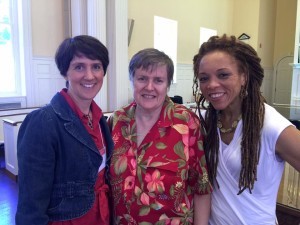
Me, Kathleen Norris, and Sophronia Scott. This happened.
On Friday I flew home from the second annual Frederick Buechner Writers Workshop at Princeton Theological Seminary. I had served for the week as writer-in-residence leading twenty students in the advanced writers course; and, like anyone returning from a gathering in one’s Mother Tongue, I was giddy. I wanted to write forever, for all of you, and especially for my students.
But the plane landed and there were diapers.
And email. And national heartbreak.
And all the other reasons for not getting our writing done [insert yours here]. It’s real life, isn’t it? Here we are, back in the thick of things, and if you’re anything like me the vanishing dream of your good intentions feels all-too familiar, like a form of spiritual defeat. Pair that with general discouragement about the cold metrics of publishing and the cruelty of current events, and we’re tempted to think of last week as a sort of secluded island resort: lovely, unforgettable, but we don’t get to live there.
Fight that feeling.
Remember Frederick Buechner’s quote about “the world’s deep hunger”? That hunger for beauty, or courage, or fidelity, or wisdom, or whatever it is that makes you want to be a writer, that’s your hunger too. And when the world’s deep hunger and your deep hunger find themselves imbued with all the gladness of God (think of those hundreds of voices in chapel, the pipe organ resounding in your chest), the call is clear. You can’t not write. You never will be truly glad until you do.
Meanwhile, here is the world at your door, still hungry. (Small person sitting next to me has just asked for his fortieth grape.) And so we are given a dance, like the tarantella, a whirling dervish of a reel that can both purge the poison of our writerly discontent and pour us out, like the kenotic hymn, to serve the things of God.
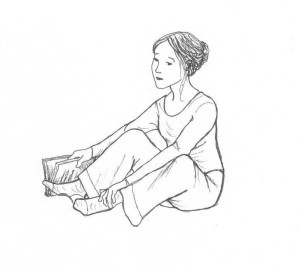 The job of Savior, as one of my seminary professors said, already has been taken. So we open our hands, unclench our fists, recognize that while we can dance with the world, we cannot save it. My small son, who is presently insisting that I’m a mommy flamingo (I’m writing while standing one-legged at the counter, right foot propped against left knee), will not arrive at the end of his breath thanking me alone for the redemption of his soul. He also will thank books. He will thank utter strangers who put words on a page and sent those words out into a largely unmoved populace. He will thank you who wrote them, you who edited them, the many dozens of people who proofed and cut and bound and sold them.
The job of Savior, as one of my seminary professors said, already has been taken. So we open our hands, unclench our fists, recognize that while we can dance with the world, we cannot save it. My small son, who is presently insisting that I’m a mommy flamingo (I’m writing while standing one-legged at the counter, right foot propped against left knee), will not arrive at the end of his breath thanking me alone for the redemption of his soul. He also will thank books. He will thank utter strangers who put words on a page and sent those words out into a largely unmoved populace. He will thank you who wrote them, you who edited them, the many dozens of people who proofed and cut and bound and sold them.
He will thank all of you.
As do I. Last week was an unrepeatable gift. The gift of yourselves to one another, the gift of yourselves to me, the gift of that too-warm classroom with our brains on content-overload and our fellow writers struggling to pair verbs and nouns fearlessly, as if we do this all the time, for a living, in order to live, which of course we do.
“Here is the world,” Buechner said: “beautiful and terrible things will happen. Don’t be afraid.” Write that world. Write those beautiful and terrible things. Write the fear, the courage. Write as if you could salve the hunger, quench the thirst, part light from darkness. Write one-legged at the kitchen counter, amidst the obstinate quiddity of animate and inanimate things, as if a small boy someday will grow up to read your words and climb further into grace.
This is the world.
Be brave. Be generous.
Write on.
_________________________________
 Sarah Arthur is a fun-loving speaker and the author of over eleven books, including At the Still Point: A Literary Guide to Prayer (Paraclete Press) and the forthcoming The Year of Small Things: Radical Faith for the Rest of Us (with coauthor Erin Wasinger; Brazos Press, Jan. 2017). Sarah is totally fangirling about the 2017 Buechner workshop keynote, Anne Lamott. www.saraharthur.com
Sarah Arthur is a fun-loving speaker and the author of over eleven books, including At the Still Point: A Literary Guide to Prayer (Paraclete Press) and the forthcoming The Year of Small Things: Radical Faith for the Rest of Us (with coauthor Erin Wasinger; Brazos Press, Jan. 2017). Sarah is totally fangirling about the 2017 Buechner workshop keynote, Anne Lamott. www.saraharthur.com
May 5, 2016
Sarah Arthur’s Top Ten Tips for Getting it Done
 Hallooo, faithful readers! A rare dispatch from the Writing Zone, where I’m still recovering from co-authoring book #11 and meanwhile leading seminars on, of all things, getting your writing done. (Insert caustic “ha!”) Here’s a summary from “Getting it Done,” which I presented at the inaugural Frederick Buechner Writers Workshop at Princeton Theological Seminary in June 2015, which I’ll recap for the Advanced Writers Course there this year, plus some fun new material. It’s not too late to register for the conference, by the way. (Last year’s event was keynoted by Barbara Brown Taylor and Rachel Held Evans, which didn’t make me feel out of my depth at all. This June it will be Philip Yancey & Kathleen Norris: need I say more?).
Hallooo, faithful readers! A rare dispatch from the Writing Zone, where I’m still recovering from co-authoring book #11 and meanwhile leading seminars on, of all things, getting your writing done. (Insert caustic “ha!”) Here’s a summary from “Getting it Done,” which I presented at the inaugural Frederick Buechner Writers Workshop at Princeton Theological Seminary in June 2015, which I’ll recap for the Advanced Writers Course there this year, plus some fun new material. It’s not too late to register for the conference, by the way. (Last year’s event was keynoted by Barbara Brown Taylor and Rachel Held Evans, which didn’t make me feel out of my depth at all. This June it will be Philip Yancey & Kathleen Norris: need I say more?).
Getting It Done: Because Writing Doesn’t Just Happen
By Sarah Arthur
Q1: What is that one thing you must start/finish/work on? (Or, to put it in graphic terms, if you were to die in an epic car crash this afternoon, what would you regret never having finished?)
Q2: What’s keeping you from getting it done?
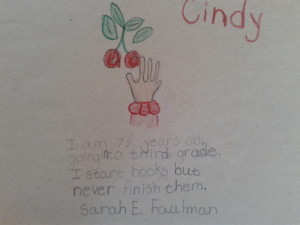
Inscription from one of my first “books,” circa 1980. Editors & co-authors take note: this has not been a self-fulfilling prophecy (all of the time).
I’m not naturally inclined toward getting my writing done (see photo at right). So what I’m presenting comes after fifteen years in this business. We are fully competent adults at getting things done in other areas of our lives (e.g., running errands, mowing the lawn, parenting, ministry), and yet writing is this BIG MYTHIC THING that paralyzes many of us. We assume that inspiration will strike, and that’s when we’ll write. But most of the time, writing doesn’t just happen. As Anne Lamott says, it’s “a debt of honor” that either we keep by getting our butts in the chair, or we don’t. (Here’s a great interview with Anne Lamott about this and other aspects of writing.) In short, most of the things that keep us from sitting down to write are internal, not external. With that in mind, here are
Sarah’s Top Ten Tips for Getting it Done:
1. Prioritize your writing as more than just a hobby. If you can’t shake this project, it’s probably because you are being called to write it; and if you’re being called then it’s worthy work: it’s a job. If you think of it as a “job,” budget your time and finances accordingly.
2. Set aside designated writing time / make an appointment with yourself. If you have a dentist’s appointment, do you go? In my family this takes serious heroics (dentist’s appointments and writing) especially regarding childcare, but we make it happen because it’s important. It’s my calling, my job.
3. Accountability. Tell your loved ones & friends what you’re doing. Your goal is to have at least two people ask you in the next few months “How is the writing going?” Join a class or a writer’s group (even if it’s virtual). Or, like I do, meet with a friend for a writing date once a month: the goal is not to read & critique each other’s work, but to put your butts in the chair and to know that you’ve written nonstop for two hours at least once this month. Since your friend is counting on you, you’re more likely to show up.
4. Think in small chunks. If you have it in your head that you are WRITING A BOOK it can be overwhelming. Instead, give yourself word counts or page goals or sections, and don’t feel like you have to complete one thing before you can chronologically move on to the next thing. One small bit at a time.
5. Think like a binder or a scrapbook, not like a finished book. Yet. Here’s where it gets real for me: I write in Scrivener, which operates on a binder concept; but you also could create an actual 3-ring binder for your project. That way you can move material around, write non-chronologically, tackle the Acknowledgements if you’re stuck on something else (invent people to thank, if you have to), and not get hopelessly lost in endless word processing documents that are impossible to navigate.
6. Set deadlines. Even if they’re arbitrary, based on personal benchmarks (e.g., “I want to have this drafted by the time I’m ____” or “by the next writing conference.”), deadlines are super motivating. Especially if money or treats are involved.
7. Hold your work loosely. No combination of words should have the power to bind you–not even your own words. If you can’t “kill your darlings,” do what I do, which is give them a Time Out (lift that tricky paragraph or episode or story into a separate section of your binder, or into another document). And then move on to the next thing. You can always come back to that material later if you think you might need it. (You won’t, but it can be comforting to think it’s still there if you might.)
8. Think outside the desk. Changing where you write might be the break-through that you need (a coffee shop, a different location of your house, the kitchen table, your bed, someone’s cabin). Frederick Buechner wrote for a season in a Sunday school classroom of a church. I once finished a manuscript by escaping to a friend’s guest house for a week. Another author I know takes her fifth wheel to a campground and drafts her next novel in 1-2 weeks. ONE-TO-TWO WEEKS. Okay, ignore the insanity of that timeline and focus on the campground, where no one cares if you’re antisocial, as long as you silence your dog (my advice: don’t bring your dog); and everyone, not just the novelist, looks like they haven’t showered. Also, give yourself permission to take a break from the work: do something else entirely, something mundane, like fold the laundry. Your subconscious is still working, and sometimes you might have a breakthrough while you’re not working on the work you’re supposed to be working on.
9. Write as if you’re someone else. At heart, writing is not about expressing yourself (mucho bad writing has entered the blogosphere with that in mind); it’s about forgetting yourself. Maybe I’m weird, but when I pretend I’m someone famous (like Anne Lamott or Maya Angelou or Frederick Buechner or C. S. Lewis) my words are suddenly competent or funny or eloquent or articulate. If we write like the “masters” of our craft, eventually we can begin to improvise on their style and develop our own. But this takes time–and it takes reading many voices, reading all the time. Oh, and one slightly embarrassing side note: often when I edit, I read the manuscript out loud with a British accent. Yup. Amazing how intelligent your words can sound–and how obvious those moments of bad grammar can be–when it’s Hermione Granger saying them.
10. Give yourself permission to pick the low-hanging fruit while it’s ripe. Sometimes–rarely, but sometimes–inspiration will strike, and you have to write while it’s pouring out of you. So do what you need to do: take personal days or sick days, eat the awful snacks that keep you going, stay up till 4 in the morning, whatever it takes. The farmer doesn’t apologize when the strawberries are in, right? So harvest that stuff. Right. Now.
How about you? What’s your top ten list for getting it done? Comments, please!
Some Suggested Resources:
Festival of Faith & Writing at Calvin College in Grand Rapids, MI, April 14-16, 2016.
Scrivener – the writing software that I ADORE.
Books & Such Literary Agency’s blog
National Novel Writing Month
Rescue Time – tracks your computer use, helps you set goals, and identifies how you are wasting time.
“5 Habits of Motivated Novelists” by Rachelle Gardner.
“Honoring Your Passion to Write” by Sarah Arthur.
“Top Occupational Hazards of Freelancing From Home” and “Writing Well in a Season of Lament” by Sarah Arthur.
Redbud Writers Guild – community of women writers of faith
Northern Michigan C. S. Lewis Festival
Bird by Bird by Anne Lamott
The Alphabet of Grace by Frederick Buechner
The Writing Life by Annie Dillard
A Syllable of Water: Twenty Writers of Faith Reflect on Their Art, Emilie Griffin, ed.
On Becoming a Novelist and The Art of Fiction by John Gardner
April 6, 2016
For Aspiring Writers: Your One-Stop Conference/Festival Etiquette Guide
For Aspiring Writers: Your One-Stop Conference/Festival Etiquette Guide
By Sarah Arthur
As a published author who has made some of my biggest breaks by meeting editors at writing conferences, I’m often asked how I did this. How does someone who is relatively unknown get on the publishing radar? And how does one do this without alienating the entire industry, or selling your soul—or both?

Photo credit: Calvin College.
My story is rather unusual, as I describe in this fun podcast interview—and I’m not entirely certain how it all happened (good weather? planetary alignments? divine somethingness?). So to answer the above questions I scribbled down my hunches and then messaged a group of veteran writers, editors, and poets, asking, “If you were to write a conference/festival etiquette guide for aspiring writers hoping to get published, what would it include?”
Their responses confirmed my hunches, plus gave me some great inside stories from the industry. What follows is your One-Stop Conference/Festival Etiquette Guide. For those who’ve been in the conference circuit for awhile, what else would you add?
Be there to learn. Unless you’ve been doing this writing/publishing thing for longer than most editors have been alive, consider the conference itself as a relatively inexpensive college-level course in a topic about which (as an unpublished author) you know slightly more than nothing. This applies not only to what you can learn about the publishing industry but about the craft of writing itself, and even—yes: brace yourself—your own work (see #8).
Treat editors like human beings. I can’t stress this enough. As one editor says, “Please don’t look at editors as inhuman publication machines who exist only either to do something for you or to reject you because they’re jerks.” Editors are real people who have to eat and pee and sleep like everyone else. Some of them miss their families; others have medical conditions, for pity’s sake. Find an area of common interest that doesn’t involve your cherished project. One editor advises, “Approach editors/publishers as fellow book-lovers and go from there.” Demonstrating that you’re a team player by showing you can give and take graciously in a mutual conversation is key. “Writing is a solitary discipline,” says that same editor, “but publishing, especially at the small press level, is a collaborative endeavor and needs a solid platform of trust, shared artistic values, and enterprise-in-common to work.”
 Research before you make a pitch. No: the publisher that’s never published monologues does not want to hear your monologue about your groundbreaking monologue. You will not make them abandon their brand, much less their founding vision, in one thirty-second conversation. Get online before the conference and learn what they do and don’t publish—not just genres but topics, issues, and authors. Purchase some of their books and not only read them but review them on Goodreads and Amazon, even on your own blog. In the words of one editor, “Haven’t read any of our books? Then why do you think you’re a good fit?”
Research before you make a pitch. No: the publisher that’s never published monologues does not want to hear your monologue about your groundbreaking monologue. You will not make them abandon their brand, much less their founding vision, in one thirty-second conversation. Get online before the conference and learn what they do and don’t publish—not just genres but topics, issues, and authors. Purchase some of their books and not only read them but review them on Goodreads and Amazon, even on your own blog. In the words of one editor, “Haven’t read any of our books? Then why do you think you’re a good fit?”Ask questions. College course, remember? You’re here to learn, which means pursuing lines of inquiry with a kind of earnest curiosity—even delight. “Ask about their publications, ask what they like to see and where to find guidelines,” says one editor. Keep in mind that many editors are also writers: one suggests, “Ask them about their work. Don’t bring up your own work. After talking about what they do for a minute or two, they may ask about what you do.” Another says, “If you’re new to publishing and truly just want to have a conversation about how things work and make some friends, then do that! Just be clear about what you need/want from the conversation and most editors will be happy to talk with you.”
Listen. It seems obvious, but once you’ve asked a question, close your mouth. For as long as they keep talking. Then follow up with another question. Attend an editor’s workshop(s); be there if the editor is on a panel. Read books the editor has written, if any. Become, if you will, a kind of disciple. But also be mindful that the editor only has so many people he or she can engage in a day. Someone else might be standing in line behind you, and out of respect for the invisible fellowship of writers around the world, without whom you wouldn’t be a writer yourself, step graciously aside. Then go find another editor to listen to.
 Buy their publications. In the words of one editor, “Consider budgeting to buy a few things to show your good faith understanding that publishing houses and small presses don’t survive without reader support.” If the publisher has a booth in the Exhibit Hall, take their products seriously: browse; then, if you find their titles or back issues intriguing, purchase something. One writer, who is also professor, says, “If you are a professor/instructor ask about a publisher’s books for your classes. I use small press titles whenever I can. Twenty copies bought for a class makes a big difference to a press like that.” Another editor says, “I’m much more willing to look at your manuscript if you are willing to support the press. It might end up being the best $20 you ever spend.”
Buy their publications. In the words of one editor, “Consider budgeting to buy a few things to show your good faith understanding that publishing houses and small presses don’t survive without reader support.” If the publisher has a booth in the Exhibit Hall, take their products seriously: browse; then, if you find their titles or back issues intriguing, purchase something. One writer, who is also professor, says, “If you are a professor/instructor ask about a publisher’s books for your classes. I use small press titles whenever I can. Twenty copies bought for a class makes a big difference to a press like that.” Another editor says, “I’m much more willing to look at your manuscript if you are willing to support the press. It might end up being the best $20 you ever spend.”Be up front about your interest in making a pitch. Note this doesn’t say, “Pitch your project unsolicited.” You can’t throw your material at someone you’ve never met, unasked, and expect them to take you seriously. Rather, this is saying, “I really appreciate your publishing house’s vision and titles—including _________, which I’ve just reviewed on Goodreads. And it’s made me think that what I’ve written might be a good fit for you. Would you be open to me emailing you about that sometime?” And then the editor will either outline their company’s submission process (and you’d better take notes), or ask, “Well, what’s it about?”—because that way they know whether an email correspondence will be worth their time or become a vast black hole in the literary space-time continuum. Don’t be aggressive, but at the same time, says one editor, “Don’t offer to meet me for coffee under the auspices of asking a few questions when you really want to pitch a book. Just give me your damn pitch.”
 Hold your work lightly. At the first writing conference I ever attended, before I got published, I had grand visions of becoming a children’s book writer and illustrator. I came with manuscripts, a portfolio of illustrations, business cards and proposals to that effect. Pause at this point and take a look at my list of published works. Do you see any illustrated children’s books on there? No? That’s because the connections I made at that original conference ultimately had nothing to do with what I thought my work was about. Keep this in mind as you lug that little stack of proposals and sample materials around with you from workshop to workshop, from booth to booth in the Exhibit Hall. If you’re holding your cherished project in a closed fist, it might be time to open your hand a bit. What else might come of these connections?
Hold your work lightly. At the first writing conference I ever attended, before I got published, I had grand visions of becoming a children’s book writer and illustrator. I came with manuscripts, a portfolio of illustrations, business cards and proposals to that effect. Pause at this point and take a look at my list of published works. Do you see any illustrated children’s books on there? No? That’s because the connections I made at that original conference ultimately had nothing to do with what I thought my work was about. Keep this in mind as you lug that little stack of proposals and sample materials around with you from workshop to workshop, from booth to booth in the Exhibit Hall. If you’re holding your cherished project in a closed fist, it might be time to open your hand a bit. What else might come of these connections?Learn how to graciously take “no” for an answer. For your reading pleasure, here’s an example of what not to do, as supplied by an editor for whom this was a real-life experience at the AWP last week:
Clueless Jerk: Hi, Editor! Here’s my chapbook manuscript. [shoves pile of papers in Editor’s face]
Editor: We only accept manuscripts online. Also, we don’t publish chapbooks. Try X, Y or Z publishers down the line.
Clueless Jerk: Yeah, but this is really good. I think you’ll make an exception if you read it. I’ll come back tomorrow to see what you think. [walks away]
Let’s rehearse all the things this aspiring writer did wrong, shall we? No, let’s just assume he broke all the rules. But he especially ignored a clear “no” when the editor kindly but firmly explained how their submission process works, what kinds of things they publish, and helpfully suggested some other options. That’s the end of the conversation, people. As one editor says, “I’ve had my fill of writers who want me to look at their stuff even when I’ve told them it’s not what we publish. Just stop talking!” After a publisher explains why your work isn’t a good fit, you simply say, “That’s really helpful. Thanks so much!” Then you browse their products, purchase something (if possible, particularly if you think this publisher might be a good fit for something else you could work on down the road), smile, and walk away.
Honor the relationship. Have I said that editors are real people? Yep. They have only so many hours a day to answer email, respond to follow-up questions, or set appointments. So whatever happens after your interaction should remain professional, cheerful, and brief—and above all, should respect that the publishing process (including correspondence) is often glacially slow due to the volume of material an editor is reviewing. Haven’t heard back in two weeks? Two months? This is normal. One follow-up email by you 6-8 weeks after the conference is appropriate, but after that, leave it alone. And again: take “no” for an answer. Yet another lovely example supplied by my editor friends after AWP:
Clueless Jerk Number Two: Hi, Editor. About the manuscript that I sent, do you know if it received any consideration at all?
Editor: I don’t remember your manuscript, and you haven’t helped by not mentioning the title. We receive 150 manuscripts per year. I only see the last twenty or thirty, after grad students do the screening. You could submit next year. There will be a different pool of graduate students, and you might have better luck.
Clueless Jerk Two: I’ll just come back to the table later when there’s a grad student here and creep her out by giving her dirty looks and asking why she turned down my amazing manuscript.
Editor: Okay, good luck with that. Creep.
(Test question: What ten etiquette rules did the above conference attendee break?)
To wrap up, I tell one last story from my personal experience. I first met one of my editors at the Festival of Faith and Writing at Calvin College in Grand Rapids, MI, four years ago. He and I both happened to be waiting for colleagues who were engaged in conversation, so I turned to him and said, “Hi Dan [not his real name], I’m Sarah Arthur. You’re one of the editors at Woodhouse [invented], right?” He was cordial, and then I asked him if he ever got to simply enjoy the workshops, or if he was trapped with one appointment after another. At which point he warmed right up, talked for awhile, then asked me what I do. Soon he motioned for me to sit, and we talked for another 15 minutes—out of which came lunch and a book deal.
Yep, treat editors like human beings. Not that they’ll all give you a book deal. But they’ll remember their humanity was honored, that someone gave them the chance to exhale.
_______________________________________
 Sarah Arthur is a fun-loving speaker and the author of eleven books, including the bestseller Walking with Frodo (Tyndale) and the literary guides to prayer series with Paraclete Press (At the Still Point, Light Upon Light, and Between Midnight and Dawn). Her forthcoming book, co-authored with friend and colleague Erin Wasinger, is The Year of Small Things: Radical Faith for the Rest of Us (Brazos Press, spring 2017). www.saraharthur.com
Sarah Arthur is a fun-loving speaker and the author of eleven books, including the bestseller Walking with Frodo (Tyndale) and the literary guides to prayer series with Paraclete Press (At the Still Point, Light Upon Light, and Between Midnight and Dawn). Her forthcoming book, co-authored with friend and colleague Erin Wasinger, is The Year of Small Things: Radical Faith for the Rest of Us (Brazos Press, spring 2017). www.saraharthur.com
April 1, 2016
Spiritually healthy ways of measuring “success”
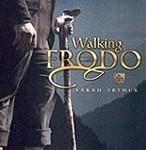 I recently had the chance to be interviewed by pastor/podcaster/author Noah Filipiak on his podcast “Behind the Curtain”. Amazing what kind of territory you can cover in an hour! Everything from how I got started in publishing and the panic-inducing word “platform,” to what my literary guides to prayer are like, and how I try (and mostly flunk) at maintaining daily spiritual rhythms. Best of all, we found ourselves exploring spiritually healthy ways of measuring “success”, whether in writing, ministry, or just everyday life. I’m grateful to Noah for the chance to consider these topics out loud.
I recently had the chance to be interviewed by pastor/podcaster/author Noah Filipiak on his podcast “Behind the Curtain”. Amazing what kind of territory you can cover in an hour! Everything from how I got started in publishing and the panic-inducing word “platform,” to what my literary guides to prayer are like, and how I try (and mostly flunk) at maintaining daily spiritual rhythms. Best of all, we found ourselves exploring spiritually healthy ways of measuring “success”, whether in writing, ministry, or just everyday life. I’m grateful to Noah for the chance to consider these topics out loud.
Follow him @noahfilipiak, and look for his (forthcoming, we just know it!) books at his website “At a Crossroads.” And, in just two seconds, could you please hop over to Facebook and “like” his author page? Such a simple way to help an aspiring author out. You can “like” mine too, while you’re at it 
February 5, 2016
New book for Lent & other good things
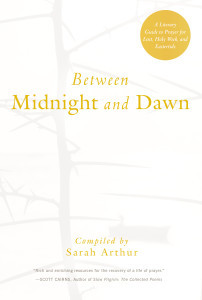
Lenten guide
Somehow, Lent is just around the corner (this Wed., Feb. 10)! And with it comes my next literary guide to prayer with Paraclete Press, Between Midnight and Dawn: A Literary Guide to Prayer for Lent, Holy Week, and Eastertide. It’s currently the #1 New Release in Christian Pastoral Resources on Amazon [I have no idea what that means, but I’ll take it :)]. I’m so proud of the poets & novelists that contributed to this anthology: they’re the reason it earned a fantastic review by Image Journal, and they continue to amaze me with their talent and generosity.
For a sneak peek, to order copies by Ash Wed., and to catch a couple of corrections that will appear in the second edition, visit the book page on Paraclete’s website.
 I’m also excited and relieved to have turned in the manuscript for my eleventh book (!), co-authored with my dear friend, the long-suffering, eloquent Erin Wasinger. The working title is The Year of Small Things: Radical Faith for the Rest of Us, charting our families’ year-long experiment implementing twelve “radical” Christian practices in the spirit of Shane Claiborne and the movement known as “new monasticism.” It will be coming out from Brazos Press (an imprint of Baker Books) sometime next year. I’m pretty sure we sweated blood, or at least we cried a lot; and somehow we’re still friends. There may or may not have been adult beverages involved when we finally turned that sucker in. Congratulations, @SomeWonderland!
I’m also excited and relieved to have turned in the manuscript for my eleventh book (!), co-authored with my dear friend, the long-suffering, eloquent Erin Wasinger. The working title is The Year of Small Things: Radical Faith for the Rest of Us, charting our families’ year-long experiment implementing twelve “radical” Christian practices in the spirit of Shane Claiborne and the movement known as “new monasticism.” It will be coming out from Brazos Press (an imprint of Baker Books) sometime next year. I’m pretty sure we sweated blood, or at least we cried a lot; and somehow we’re still friends. There may or may not have been adult beverages involved when we finally turned that sucker in. Congratulations, @SomeWonderland!
December 10, 2015
The Good Spell
 My five-year-old (I have a five-year-old! When did this happen?) recently informed me that he loves Christmas.
My five-year-old (I have a five-year-old! When did this happen?) recently informed me that he loves Christmas.
“Why is that?” I asked.
Pajama-clad, he twirled slowly in an office chair in our darkened living room, gazing at the lights from the Christmas tree. Then he sort of shook himself, sighed with contentment, and said, “Because the lights tell a story on the wall.”
It’s an old, old story, friends. But the magic of it never fades. After all, the word “gospel” comes from Old English: “god” (good) and “spel”–meaning news, or story, and of course also meaning enchantment. In this busy season we are in need of some good spells. We need to be enchanted, or re-enchanted, like a five-year-old in pajamas. We are likewise in need of having spells broken, spells of fear in a world that seems chaotic beyond all reason. The good news of Christmas–that God is with us in Jesus–works both ways. “Fear not,” said the angel to Mary, and the spell of powerlessness began to unravel. “Fear not” said the angel to the shepherds, and the spell of terror loosed its grip. “Fear not,” I whisper to my sons asleep in bed, to my own anxious self. And the spell of peace, of joy beyond reason, lays hold of our hearts.
God is here.
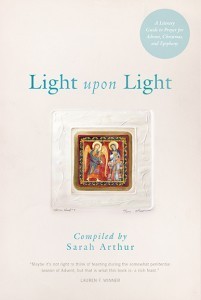 As I look ahead to this season and into 2016, I’m excited about what God is doing. Books, events, growing boys, local church ministry…it’s all good. But it’s easy in the busy-ness to slip back under the power of those old “spells.” I ask for your prayers in 2016.
As I look ahead to this season and into 2016, I’m excited about what God is doing. Books, events, growing boys, local church ministry…it’s all good. But it’s easy in the busy-ness to slip back under the power of those old “spells.” I ask for your prayers in 2016.
Here are some highlights:
I’ve had some fun radio spots & podcasts for Advent lately: they can be found here. In what ways does sentimentality get in the way of the true meaning of Christmas?
It’s yet another Advent season to curl up with a good book and let it work a good spell on you, so I hope you’ll revisit Light Upon Light: A Literary Guide to Prayer for Advent, Christmas, & Epiphany. I’m still in awe of the poets and novelists whose works I had the great privilege to include.

Literary guide to prayer for Lent, Holy Week, & Eastertide (Jan 2016)
UPDATE: The third and final literary guide to prayer is HERE! Between Midnight & Dawn: A Literary Guide to Prayer for Lent, Holy Week, & Eastertide (Paraclete Press) completes the liturgical year in the series that includes At the Still Point and Light Upon Light. Signed copies make great Christmas gifts for the lit-geeks and former English majors in your life.
If you would be interested in joining the Book Launch Team for Between Midnight & Dawn (free review copy! author gratitude!), please email me your shipping address and list at least two ways you can help get the word out (Amazon & Goodreads reviews are great). Please also include your social media handles/links. sarah (at) saraharthur.com.
2016 takes me to two of my favorite writing conferences, the Festival of Faith & Writing at Calvin College in Grand Rapids, MI April 14-16, where you’ll see me doing stuff with the Redbud Writers Guild; as well as the Fredrick Buechner Writers Workshop at Princeton Theological Seminary in Princeton, NJ June 7-10, where I’ll lead the Advanced Writers Class. Can’t wait!
Stay tuned for updates on my forthcoming book with Brazos Press, The Year of Small Things: Radical Faith for the Rest of Us, co-authored with the amazing Erin Wasinger. Watch that girl: you knew her when…
Peace to you & yours this season and into 2016.
December 2, 2015
Christmas podcasts & interviews
I’ve had some fun being interviewed for various radio programs & podcasts, including a feature today about Christmas & sentimentality on Family Life Radio’s “Inside Out”. The full podcast is available here (20 minutes): http://www.fln.org/news/features/deta.... And the 2014 article that kicked it all off is here at Her.meneutics: http://www.christianitytoday.com/wome.... (For the record, my relationship with my mom is awesome; I was thinking of so many friends who struggle in this area. 
Also got to speak with Lynne Ford at WBCL in Fort Wayne on my birthday for their “Author! Author!” show: http://www.wbcl.org/archives/2015/11/.... I’m the second author interviewed, about 10 minutes in.
More holiday updates coming soon!
September 24, 2015
Sarah Arthur’s Top 10 Tips for Revising/Editing
Awhile ago a friend asked for tips on revising/editing. Here’s what I said, based on things I’ve done as a writer and editor over the past sixteen years:
(1) Pretend you’re an editor in Manhattan with no time to waste. Be ruthless, as if you just arrived at your desk after hideous traffic snarls and have exactly one hour to sip Starbucks before the next meeting in which you will crush some writer’s hopes. Dress the part if you have to.
(2) Read the article out loud to yourself in a British accent: you will immediately notice the bad grammar, not to mention all the places where it sounds dumber than necessary.
(3) Don’t let yourself listen to your favorite music except while revising.
 (4) Reward yourself with chocolate after each finished paragraph or section.
(4) Reward yourself with chocolate after each finished paragraph or section.
(5) Print the darn thing (double-spaced) and mark it up with a colored pen–yes, even red pen, if it makes you sit up straight and start behaving like you can handle criticism (because nothing you do to yourself will be as unkind as what readers will do to you). For a book-length manuscript, save it as a pdf (double-spaced, two-sided) and email it to the printing center at your local office supply store for pickup later. This is a grownup business expense, people.
(6) For a book-length manuscript: format and save it as an e-pub file in Dropbox or Google Drive (or email it to yourself), then download and open it on your e-reader as if it’s a novel that someone actually published. Then sit in your comfiest chair, like you’ve just bought something by Bret Lott, and start reading. Would you like it? Would you keep reading? In this exquisitely short life, for which there are far fewer days that books to read, would you bother swiping to the next page?
(7) Cry.
(8) Throw things.
(9) Walk away. Count to ten–even ten days. It’s like parenting small children, actually. You could hurt this thing and yourself if you press on. Come back later, after your heart-rate goes back down and your breathing returns to normal.
(10) Recognize that you will never be done editing. At some point you have to say “Good enough,” wipe your hands, and treat yourself to a 1500-calorie dessert somewhere. Adult beverage not optional.
March 19, 2015
“Spring” Update: Booksigning & sale; writing in community
Since I’ve already made it clear that I’m not a blogger, I feel no shame in the fact that I haven’t posted since October–phew! This used to keep me up at night: trust me. Any writer worth her salt is blogging, right? As if I need to keep yet one more plate spinning…
But no, I write books. There it is. That’s what I have to offer, dear reader. So if there are long periods of silence it’s because I’m writing (like a fool), not one, but TWO books slated for release in 2016. More on that in a sec.
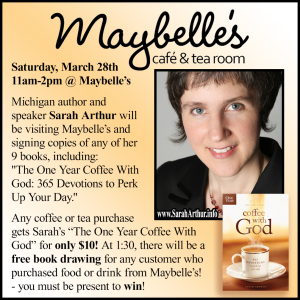 First, I have a fun book-signing coming up on Saturday, March 28 at Maybelle’s Cafe & Sweets in Grand Ledge, Michigan, 11 AM to 2 PM. Call it a “Spring Coffee Break” (as if any of us need an excuse to beat cabin fever!). There will be book discounts & a drawing for Maybelle’s customers, plus lots of book title options for graduations, Mother’s Day, baptisms, weddings, anniversaries, birthdays, and more. Come support a local business & a local author! Hang out with other people who love caffeine AND books (really, what more could you want?)!
First, I have a fun book-signing coming up on Saturday, March 28 at Maybelle’s Cafe & Sweets in Grand Ledge, Michigan, 11 AM to 2 PM. Call it a “Spring Coffee Break” (as if any of us need an excuse to beat cabin fever!). There will be book discounts & a drawing for Maybelle’s customers, plus lots of book title options for graduations, Mother’s Day, baptisms, weddings, anniversaries, birthdays, and more. Come support a local business & a local author! Hang out with other people who love caffeine AND books (really, what more could you want?)!
Second, I’m running a SPRING SALE on almost all titles via my “Shop” page: discounts & free shipping going on, all kinds of love headed your way. If you’d like me to personalize an order, just shoot me an email: sarah(at)saraharthur.com
Third, during the past year I’ve made the shift from writing alone–from slogging away and attempting to maintain some kind of “author platform” on my own–to writing in community. Here’s the scoop:
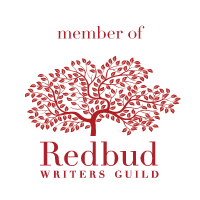 Meet the Redbud Writers Guild. I can’t say enough good things about these women. If you’re considering pursuing the writing life but find the whole publishing industry and/or the thought of building a “platform” (and/or the sheer isolation of sitting alone at a laptop stringing words together, day after day) overwhelming, then you need this posse. Other people (ahem, men) seem to have no problem spending money on mere hobbies, so speak strong language to yourself about vocation–and don’t let the application/ membership fees put you off. DO THIS.
Meet the Redbud Writers Guild. I can’t say enough good things about these women. If you’re considering pursuing the writing life but find the whole publishing industry and/or the thought of building a “platform” (and/or the sheer isolation of sitting alone at a laptop stringing words together, day after day) overwhelming, then you need this posse. Other people (ahem, men) seem to have no problem spending money on mere hobbies, so speak strong language to yourself about vocation–and don’t let the application/ membership fees put you off. DO THIS.
 Meet my friend, fellow Redbud, and co-author, Erin Wasinger. Not only do I get to see this amazing woman every Sunday at Sycamore Creek Church, but our families are in the middle of a year-long experiment in community, taking the values and practices of New Monasticism and attempting to translate them into our suburban/rural, single-family contexts. We’re recording this experiment in a forthcoming book for Brazos Press called The Year of Small Things: Radical Faith for the Rest of Us (fall 2016). Such an adventure! We’ll keep you posted along the way. In the meantime, subscribe to Erin’s blog, follow her on Twitter (or whatever form your fandom takes), and please pray for us.
Meet my friend, fellow Redbud, and co-author, Erin Wasinger. Not only do I get to see this amazing woman every Sunday at Sycamore Creek Church, but our families are in the middle of a year-long experiment in community, taking the values and practices of New Monasticism and attempting to translate them into our suburban/rural, single-family contexts. We’re recording this experiment in a forthcoming book for Brazos Press called The Year of Small Things: Radical Faith for the Rest of Us (fall 2016). Such an adventure! We’ll keep you posted along the way. In the meantime, subscribe to Erin’s blog, follow her on Twitter (or whatever form your fandom takes), and please pray for us.
 Fourth, the other book I’m writing in 2015 is the third and final installment in the literary guides to prayer series with Paraclete Press, titled The Spent Word: A Literary Guide to Prayer for Lent, Holy Week, and Eastertide (Feb, 2016). This is yet another form of writing in community as I get to curate selections and submissions by poets and novelists from throughout the centuries. If you have suggestions of works and writers I should include (particularly non-whites), please email me by April 1 at sarah(at)saraharthur.com. Meanwhile, here’s a bonus excerpt from the Christmas collection Light Upon Light.
Fourth, the other book I’m writing in 2015 is the third and final installment in the literary guides to prayer series with Paraclete Press, titled The Spent Word: A Literary Guide to Prayer for Lent, Holy Week, and Eastertide (Feb, 2016). This is yet another form of writing in community as I get to curate selections and submissions by poets and novelists from throughout the centuries. If you have suggestions of works and writers I should include (particularly non-whites), please email me by April 1 at sarah(at)saraharthur.com. Meanwhile, here’s a bonus excerpt from the Christmas collection Light Upon Light.
 And finally, for the grandparents: the boys (Micah, age 4; & Sam, age 20 months) are great–survivors of a miserable cold/flu season, but otherwise great. Micah is enjoying preschool and loves to play “worship band” (see left; note the stuffed puppy at the “drumset”); Sam is talking and obsessed with buckles, snaps, locks, and with generally taking apart the universe. We have a fantastic care-giver by the name of Alice McKinstry (yet another reason why I can’t write without community!). Hubby Tom just ran a successful capital campaign to missionally remodel our new-old church building at 1919 S. Pennsylvania in Lansing, MI, so we are breathing a little easier lately. Thanks, all, for your prayers.
And finally, for the grandparents: the boys (Micah, age 4; & Sam, age 20 months) are great–survivors of a miserable cold/flu season, but otherwise great. Micah is enjoying preschool and loves to play “worship band” (see left; note the stuffed puppy at the “drumset”); Sam is talking and obsessed with buckles, snaps, locks, and with generally taking apart the universe. We have a fantastic care-giver by the name of Alice McKinstry (yet another reason why I can’t write without community!). Hubby Tom just ran a successful capital campaign to missionally remodel our new-old church building at 1919 S. Pennsylvania in Lansing, MI, so we are breathing a little easier lately. Thanks, all, for your prayers.
Some closing wisdom from Anne Lamott’s Bird by Bird: “What people somehow (inadvertently, I’m sure) forgot to mention when we were children was that we need to make messes in order to find out who we are and why we are here–and, by extension, what we’re supposed to be writing.”
October 29, 2014
Fall Update: Cute kids, new book, author video–what more do you need?
Dear friends & fellow readers,
I’m not generally a fan of gloomy fall days, but this one makes me want to drink hot cider, snarf a pumpkin donut, and–oh, why not?–write my annual fall newsletter. Here’s the latest from my end:
 Children: Micah (3 1/2) is in preschool, while Sam (15 mo.) is a very busy toddler. Both are sweet, wonderful, challenging, bookish, verbal, funny–and completely different from each other. For a quick video of Sam at 13 months, visit my homepage.
Children: Micah (3 1/2) is in preschool, while Sam (15 mo.) is a very busy toddler. Both are sweet, wonderful, challenging, bookish, verbal, funny–and completely different from each other. For a quick video of Sam at 13 months, visit my homepage.
Ministry: Tom and I are blessed to be part of the missional congregation that is Sycamore Creek United Methodist Church in Lansing, MI, where we have become known as the congregation that has launched a Monday night satellite venue in a diner. We also just voted to purchase an old urban Methodist church building that has great potential to be our main campus while we launch more venues in the city. Please keep us in prayer!
 Books: My ninth title has just released from Paraclete Press called Light Upon Light: A Literary Guide to Prayer for Advent, Christmas, and Epiphany. As with At the Still Point, it’s a collection of readings from classic and contemporary poetry and fiction, organized by theme, for each of the weeks and key holy days of the season. I’m honored by all the fantastic endorsements & reviews that are coming in–including from folks like Lauren Winner, Andy Crouch, and the fine people at Bas Bleu. Look for related articles in forthcoming print & online issues of Christianity Today, IMAGE Journal’s Good Letters blog, and various other places. Obviously I think this book would make a great Christmas gift, but in case you need incentive I’m offering FREE shipping! Email me [sarah (at) saraharthur (dot) com] if you would like me to personalize your signed purchase.
Books: My ninth title has just released from Paraclete Press called Light Upon Light: A Literary Guide to Prayer for Advent, Christmas, and Epiphany. As with At the Still Point, it’s a collection of readings from classic and contemporary poetry and fiction, organized by theme, for each of the weeks and key holy days of the season. I’m honored by all the fantastic endorsements & reviews that are coming in–including from folks like Lauren Winner, Andy Crouch, and the fine people at Bas Bleu. Look for related articles in forthcoming print & online issues of Christianity Today, IMAGE Journal’s Good Letters blog, and various other places. Obviously I think this book would make a great Christmas gift, but in case you need incentive I’m offering FREE shipping! Email me [sarah (at) saraharthur (dot) com] if you would like me to personalize your signed purchase.
Book Give-aways: (I almost titled this section simply “give-aways” but then didn’t want you to think I was including the children!) Starting Oct. 30th I’m running a month-long give-away on Goodreads for 3 signed copies–so check here starting 10/30 to enter. I’m also running a separate give-away here on my website: subscribe to my blog between now and Dec. 1, and you’ll automatically be entered for a chance to win 1 of 3 signed copies. Enter your email address under the “subscribe” button at right. (Alas, if you’re already subscribed you might have to create a different email account to enter.) Winners will be notified by email Dec. 2.
Author video: Because in our pathologically narcissistic culture we can’t go more than a few hours without uploading a video of ourselves, I’m attempting to subvert this by uploading one every couple of years. (Or am I just technologically inept?) In any case, enjoy:





